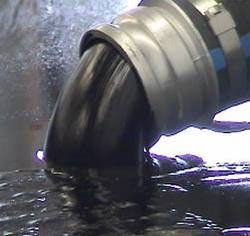The Federal Government and crude oil producers in Nigeria have agreed to work towards a sustainable supply of crude oil to local refineries under a market-determined pricing system. The goal is to ensure that operators can conduct business optimally while refineries are not deprived of feedstock.
During a virtual meeting held with the Nigerian Upstream Petroleum Regulatory Commission (NUPRC) and international oil companies (IOCs), members of the Oil Producers Trade Section (OPTS) of the Lagos Chamber of Commerce and Industry (LCCI) agreed on a mutually beneficial framework. This framework aims to prevent local refineries from being hindered by off-the-curve prices.
The meeting, initiated by Commission Chief Executive (CCE) Gbenga Komolafe, focused on reviewing the Framework for Seamless Operationalisation of the Domestic Crude Oil Supply Obligation Template. Komolafe clarified in an exclusive interview with The Nation that the decision was aimed at ensuring the country’s energy security, not at placating certain interests.
“As the regulator, it is our job to balance the interests of producers and refiners to avoid problems. If there is no product, there will be an energy gap, which is undesirable. Conversely, if there is an excess supply that leads to upstream shutdowns, it’s also problematic. We are working to maintain this delicate balance,” he explained.
Komolafe emphasized the importance of clear rules of engagement, ensuring that all parties adhere to these rules to maintain peace and order. He stated that the Commission has established a template in line with International Best Practices in Crude and Supply Trading standards. “This is not about any particular interest but about maintaining a system that works for everyone. Producers must meet their monthly obligations, and pricing is crucial. Both parties must submit their business transactions to us monthly for transparency,” he added.
In a statement issued by the Commission, it was noted that this initiative is part of the efforts to implement key sections of the Petroleum Industry Act (PIA) 2021, particularly regarding pricing and crude supply to domestic refineries.
Komolafe also indicated that President Bola Tinubu is committed to providing a level playing field for producers and refiners. He stressed the importance of a pricing model that does not hinder domestic refineries and directed that producers and refiners submit monthly cargo price quotes for effective monitoring and regulation. “We need to have the price quotes monthly,” he directed.
Komolafe highlighted the convergence between the Domestic Crude Oil Supply Obligation (DCOSO) and national energy security, stating that his team is re-engineering regulatory processes to address challenges. “We ensure transparency in all our processes. As the Federal Government targets regulation implementation, all parties must adhere to the rules of engagement,” he said.



